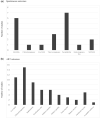Assessing the influence of preconception diet on female fertility: a systematic scoping review of observational studies
- PMID: 37467045
- PMCID: PMC10663051
- DOI: 10.1093/humupd/dmad018
Assessing the influence of preconception diet on female fertility: a systematic scoping review of observational studies
Abstract
Background: Preconception diet is a proposed modifiable risk factor for infertility. However, there is no official guidance for women in the preconception period as to which dietary approaches may improve fertility.
Objective and rationale: A comprehensive synthesis of the relevant evidence is key to determine the potentially effective dietary patterns and components as well as evidence gaps, and to provide information for nutritional recommendations for couples planning a pregnancy.
Search methods: In this systematic scoping review, four electronic databases (Medline and EMBASE via Ovid processing, CAB Direct, and CINAHL via EBSCO) were searched for observational studies (prospective and retrospective cohort, cross-sectional, and case-control studies) from inception to 27 September 2021. Eligible studies included women of reproductive age during the preconception period, and evaluated exposures related to preconception diet and outcomes related to fertility. Results were synthesized using a descriptive approach.
Outcomes: A total of 36 studies were eligible for inclusion (31 prospective, 3 cross-sectional, and 2 case-control studies) and were published between 2007 and 2022. Of the assessed dietary exposures, increased adherence to the Mediterranean diet displayed the strongest and most consistent association with improved clinical pregnancy rates. Reducing trans fatty acids (TFAs), saturated fatty acids, and discretionary food intake (fast food and sugar-sweetened beverages) were associated with improvements in live birth, clinical pregnancy rates, and related ART outcomes. The dietary components of seafood, dairy, and soy demonstrated inconsistent findings across the few included studies.
Wider implications: Due to heterogeneity and the limited available literature on most exposures, there is insufficient evidence to support any specific dietary approach for improving fertility. However, following some of the dietary approaches outlined in this review (anti-inflammatory diets, reducing TFA, and discretionary food intake) are consistent with broad healthy eating guidelines, have little to no associated risk, and offer a plausible set of possible benefits. This warrants further exploration in randomized controlled trials.
Keywords: ART; Mediterranean diet; female infertility; macronutrients; preconception diet.
© The Author(s) 2023. Published by Oxford University Press on behalf of European Society of Human Reproduction and Embryology. All rights reserved. For permissions, please email: journals.permissions@oup.com.
Conflict of interest statement
All authors declare no conflicts of interest.
Figures




References
-
- Baer DJ, Judd JT, Clevidence BA, Tracy RP.. Dietary fatty acids affect plasma markers of inflammation in healthy men fed controlled diets: a randomized crossover study. Am J Clin Nutr 2004;79:969–973. - PubMed

